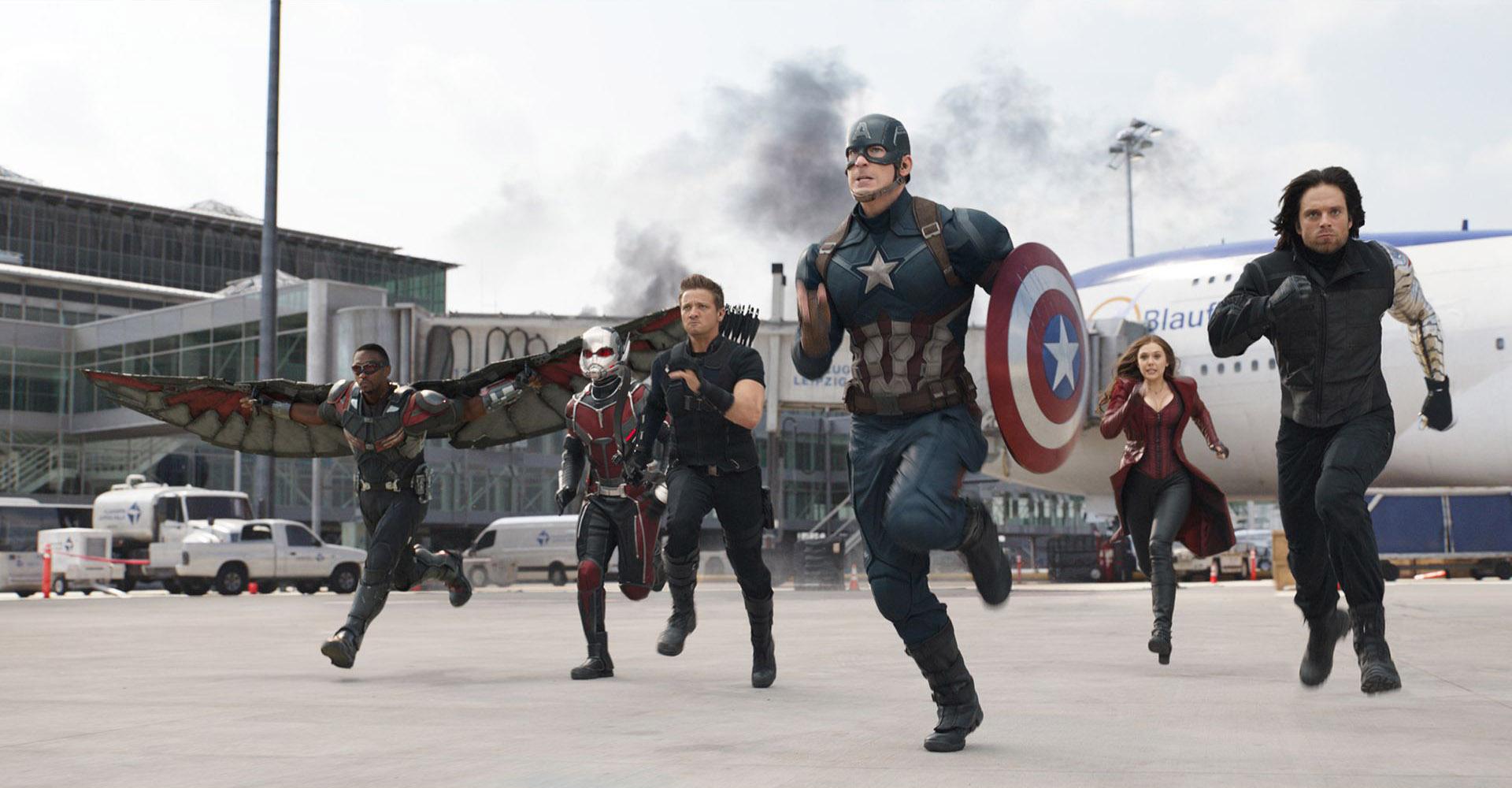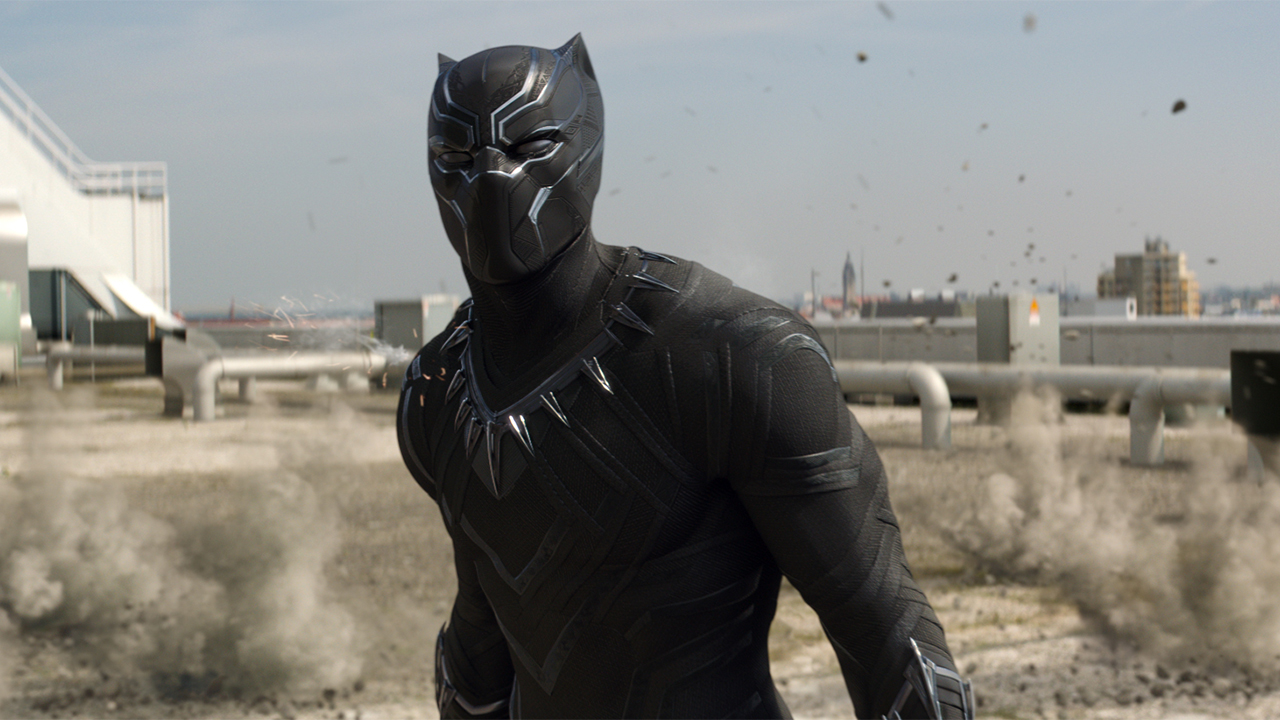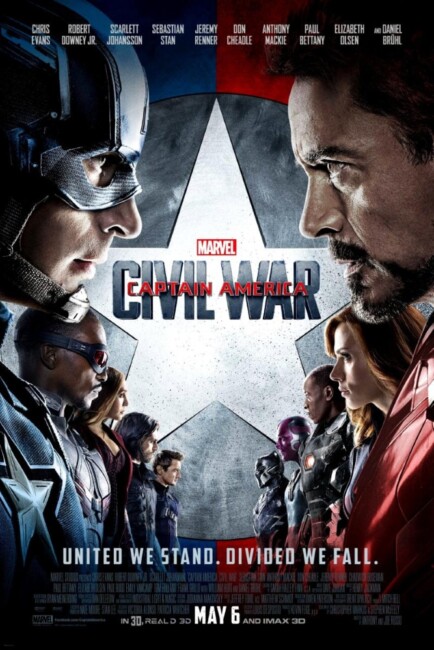USA. 2016.
Crew
Directors – Anthony Russo & Joe Russo, Screenplay – Christopher Markus & Stephen McFeeley, Producer – Kevin Feige, Photography (3D) – Trent Opaloch, Music – Henry Jackman, Visual Effects Supervisor – Dan Deleeuw, Visual Effects – Cantina (Supervisor – Stephen Lawes & Alan Torres), Capital T, Cinesite (Supervisor – Simon Stanley-Clamp), Crafty Apes, Double Negative (Supervisor – Peter Jopling), Image Engineering. Industrial Light and Magic (Supervisor – Russell Earl), Luma Pictures (Supervisor – Vincent Cirelli), Lola VFX (Supervisor – Trent Claus), Method Studios (Supervisor – Greg Steele), Rise (Supervisor – Florian Gellinger), Sarofsky, Technicolor Creative Services, Trixter Film (Supervisor – Alessandro Cioffi), Special Effects Supervisor – Dan Sudick, Suit and Prosthetic Effects – Legacy Effects (Supervisors – Shane Mahan & Lindsay McGowan), Production Design – Owen Paterson. Production Company – Marvel Studios.
Cast
Chris Evans (Steve Rogers/Captain America), Robert Downey Jr (Tony Stark/Iron Man), Sebastian Stan (Bucky Barnes/The Winter Soldier), Scarlett Johansson (Natasha Romanoff/Black Widow), Chadwick Boseman (Prince T’Challa/Black Panther), Elizabeth Olson (Wanda Maximoff/Scarlet Witch), Paul Bettany (Vision), Anthony Mackie (Sam Wilson/The Falcon), Don Cheadle (James Rhodes/War Machine), Daniel Brühl (Colonel Helmut Zemo), Tom Holland (Peter Parker/Spider-Man), Jeremy Renner (Clint Barton/Hawkeye), Paul Rudd (Scott Lang/Ant Man), William Hurt (Secretary of State Thaddeus Ross), Emily VanCamp (Sharon Carter), Martin Freeman (Everett K. Ross), John Kani (King T’Chaka), Marisa Tomei (Aunt May), Frank Grillo (Brock Rumlow/Crossbones), John Slattery (Howard Stark), Hope Davis (Maria Stark), Alfre Woodard (Miriam Sharpe), Gene Farber (Vasily Karpov)
Plot
The Avengers are in Lagos attempting to stop a Hydra operation when Wanda Maximoff accidentally causes an office building to explode. Among those killed are representatives of the African nation of Wakanda. T’Chaka, the king of Wakanda, and his son Prince T’Challa head a mission to the UN to protest this. Secretary of State Thaddeus Ross informs The Avengers that over a hundred nations are preparing to sign the Sokovia Accords that will require a UN mandate before The Avengers can go into action. The Avengers are split over this – Steve Rogers protesting that they cannot wait or be held accountable to committee decisions, while Tony Stark argues that they should sign up to these before something even more restrictive is implemented. Steve and Sam Wilson leave, knowing that this could mean their arrest. As the Accords are about to be signed in Vienna, Bucky Barnes detonates a bomb outside the building that kills dozens, including King T’Chaka. Steve races to Bucharest to find Bucky who protests that it was not he who detonated the bomb. A furious fight through the streets between the two factions of Avengers ensues in which Steve, Bucky, Sam and T’Challa, who becomes the costumed Black Panther, are arrested. Sokovian infiltrator Helmut Zemo shuts down the power in the detention facility to release Bucky. As he goes on the run with Bucky, Steve learns that there is not one but several Winter Soldiers in cryogenic hibernation. Recruiting various others including Ant Man and Spider-Man to their side, the two factions of The Avengers come together in a massive battle at the Leipzig airport. Steve pursues Zemo to the Siberian base that houses the other Winter Soldiers. There he tries to expose Zemo’s true scheme to pit The Avengers against themselves to destroy each other in revenge for the death of his family.
Beginning in 1998, Marcel Comics were adapted into a series of big hits on film screens with the likes of Blade (1998), X-Men (2000), Spider-Man (2002), Daredevil (2003), Hulk (2003), The Punisher (2004), Elektra (2005), Fantastic Four (2005) and Ghost Rider (2007).
In 2008, Marvel got into the act and consolidated their properties into a shared world they called The Marvel Cinematic Universe (The MCU). Under this banner, they rolled out huge successes that include Iron Man (2008), Captain America: The First Avenger (2011), Thor (2011), Guardians of the Galaxy (2014), Ant-Man (2015), Doctor Strange (2016), Black Panther (2018), Iron Man (2008), Thor (2011), The Avengers (2012), Guardians of the Galaxy (2014), Ant-Man (2015), Deadpool (2016), Doctor Strange (2016), Black Panther (2018), Captain Marvel (2019),Black Widow (2021), Eternals (2021), Shang-Chi and the Legend of the Ten Rings (2021), The Fantastic Four: First Steps (2025) and Thunderbolts* (2025), along with various sequels to almost all of the above. In addition, these have spilled out onto tv screens with Iron Fist (2017-8), The Punisher (2017-9), The Falcon and the Winter Soldier (2021), Hawkeye (2021), Loki (2021- ), WandaVision (2021), Moon Knight (2022- ), Ms Marvel (2022), She-Hulk: Attorney at Law (2022) and Secret Invasion (2023).
Civil War was the third of the Captain America films, following Captain America: The First Avenger (2011) and Captain America: The Winter Soldier (2014). That said, Civil War ends up being less Captain America 3 than it does The Avengers 3. What we have is essentially an Avengers film in all but name. There are certain bits of the Captain America mythos that are present – in particular, the expansion of the Winter Soldier storyline and reintroduction of Bucky, as well as the start of his relationship with Peggy Carter’s daughter Sharon. More than that though, the film offers a wide line-up of Avengers characters, as well as the introduction of others that have not been part of the action before.
The film adapts Civil War (2006-7), which was widely publicised as a major event in Marvel Comics (although the comic-book version was notedly not preceded by Captain America’s name in the title). Civil War was a seven-issue limited series, as well had continuity and lead-up that ran through over two dozen other Marvel titles. In the storyline, the US government’s efforts to implement the Superhero Registration Act, which would compel every superhero to reveal their secret identity, pits The Avengers against each other. The dramatis personae contains a massive line-up of Marvel characters – far more than we get in the film – including the X-Men, The Hulk, The Punisher, Luke Cage, Sub-Mariner and even several super-villains. The series ends with Captain America being killed, Tony Stark appointed head of S.H.I.E.L.D. and The Avengers split into two new groups – The Mighty Avengers and The New Avengers, consisting respectively of those who chose to be registered and those who did not.

The film keeps general faith to the Civil War storyline, strips the line-up down and jettisons many of the peripheral pieces of plot. More interestingly, there is no US Superhero Registration Act and the film is less concerned about secret and public identities than it is UN oversight over superheroes (which tends to dig awkwardly into issues of US unilateralism and surprisingly enough rewrites Captain America as a libertarian), while that story has also been blended with the Winter Soldier plotline.
The film mounts an impressive line-up of characters from the Marvel Cinematic Universe. We get all the familiar ones from Captain America, Iron Man, Black Widow, Hawkeye, The Falcon and War Machine. There is the omission of some regulars such as Thor, The Hulk and Nick Fury – apparently because Nick Fury added nothing to the story, while the others made the battle too powerful. Paul Rudd’s Ant Man, who appeared only a few months earlier, makes his debut as a member of The Avengers and we get to see him as Giant Man (which technically was an alternate guise adopted by Hank Pym as opposed to Scott Lang). Paul Bettany’s Vision and Elizabeth Olsen’s Wanda Maximoff/Scarlet Witch, after both were just introduced in Avengers: Age of Ultron (2015), are now full-fledged members of the group and we see the embryonic beginnings of the relationship between them that culminates in marriage according to comic-book canon. Chadwick Boseman turns up as Black Panther, who was the first ever Black superhero in 1966. (The film gives mention of his homeland of Wakanda, has his father T’Chaka killed and Wakanda is mentioned as the source of vibranium but oddly we get no explanation of Black Panther’s powers). Black Panther was granted his own film shortly after this with the massively successful Black Panther (2018).
The major new introduction to the Marvel Cinematic Universe this time is of Spider-Man. Before the MCU began in 2008, copyright of various characters was held at different studios. 20th Century Fox owns X-Men, for instance, while Universal holds the rights to The Incredible Hulk but has been happy to lease them back to Marvel. The rights to Spider-Men are held by Sony who have made various stabs at the characters – the Sam Raimi-Tobey Maguire trilogy beginning with Spider-Man (2002) and the reboot duology starring Andrew Garfield starting with The Amazing Spider-Man (2012). With the most recent Spider-Man films The Amazing Spider-Man 2 (2014) being inexplicably regarded as a flop (even though it was the twelfth biggest box-office film of its year), Sony decided to reboot Spider-Man for the second time in less than a decade and recast the part with Tom Holland for the subsequently released Spider-Man: Homecoming (2017), Spider-Man: Far from Home (2019) and Spider-Man: No Way Home (2021).
When I read about the premise for Homecoming – that of recasting Peter Parker as a high-school student – it seemed like the flailing desperation of a studio trying to milk further mileage from a property by rewriting it for a younger demographic. In one of their smartest decisions, Sony decided to accept Marvel’s offer of conducting a crossover and premiere Holland’s Spider-Man here. The result is a stroke of genius. The best scenes in the film (outside of the action sequences) are actually those with Holland who makes for a nerdily enthusiastic Peter Parker who leaps into the web-slinging action with gung ho while giving geek lectures on the tensile strength of webbing and taking inspiration from “that old movie The Empire Strikes Back [1980].”

A lot of people were calling Captain America: The Winter Soldier the best Marvel movie yet – the same ones, it seems saying the same about Civil War (and just about every Marvel film until the next one comes along). I had mixed feelings about The Winter Soldier. The Russo Brothers’ kept the action going at a fast lick but not enough of it felt like it stood out when the film was over. With that in mind, Civil War left me surprised. The Russos have upped their game from The Winter Soldier to something next level. The film exists as one giant superheroic punch-up.
The kinetic pace of the film is exhilarating. It hurtles from one sequence to the next – the opening fight through the marketplaces of Lagos; the dazzling seat-edge sequences with various people on vehicles hurtling through a road tunnel in Germany; and the climactic dust up in the Soviet cryogenic bunker that pits The Cap and Iron Man at each other’s throats with lethal regard. The film’s showcapper however is the sequence at Leipzig airport with all of the superheroes assembled furiously fighting one another around the runway and terminals, leaping from overhead struts, crashing airplanes and other vehicles down on another. It’s the sort of thing you watch superhero films for.
Where Captain America: Civil War is slightly less than a great Marvel film is much of what happens outside the action scenes. Take them out and it would be a fairly ordinary film. What made The Avengers work probably the best of all the Marvel films so far is that the camaraderie, humour and playoff between the characters made the film. The action element there was secondary to that and never anything truly earth-shattering. The Russo Brothers don’t quite seem to have their fingers on the pulse of what Joss Whedon did well – the humour and interplay between the characters here is muted, apart from the scenes when Tom Holland’s Spider-Man enters the show – and mostly the superheroics are left to carry the film.
Chris Evans’ Captain America subsequently appeared in Avengers: Infinity War (2018) and Avengers: Endgame (2019). This was followed by Captain America: Brave New World (2025) with Anthony Mackie inheriting the role of Captain America.
The Russo Brothers, Anthony and Joe, first appeared with their self-financed film Pieces (1997), which led to their being financed to make Welcome to Collinwood (2002) and You, Me & Dupree (2006), as well as being instrumental in the comedy series Community (2009-14). They joined the MCU to direct Captain America: The Winter Soldier (2014), Avengers: Infinity War (2018) and Avengers: Endgame (2019). They have made several others films with the crime film Cherry (2021), the spy film The Gray Man (2022) and the SF film The Electric State (2025). In addition, they have also produced the films Relic (2020), Everything Everywhere All at Once (2022), All Fun & Games (2023), and the tv series’ From (2022- ) and Citadel (2023- ).
(Nominee for Best Actor (Tom Holland) at this site’s Best of 2016 Awards).
Trailer here


